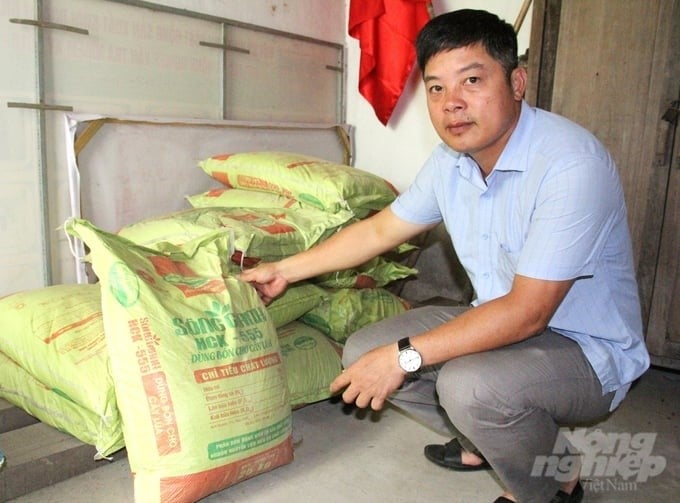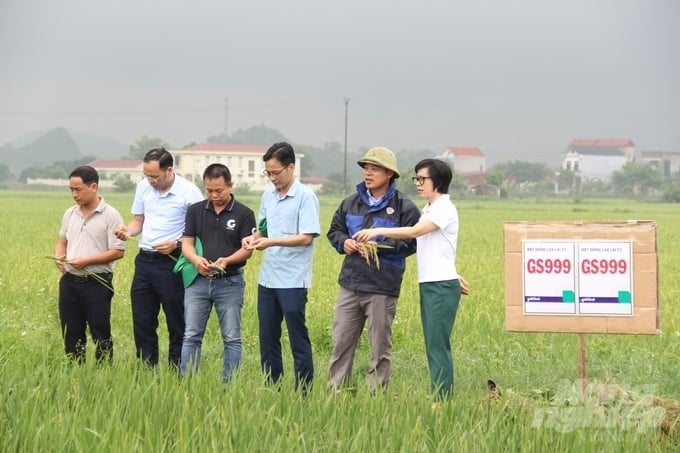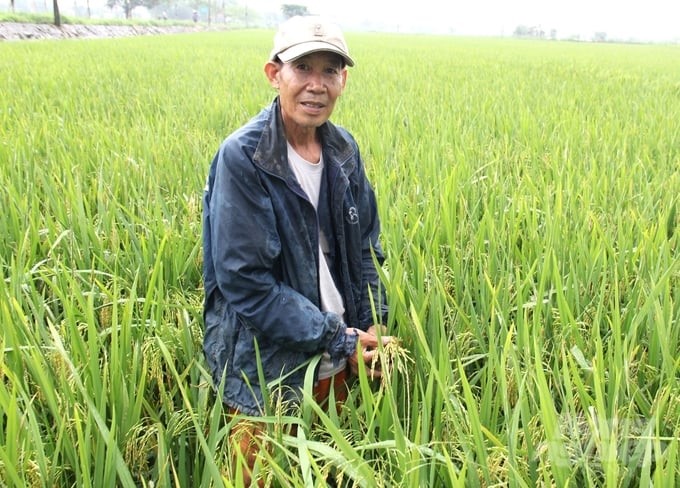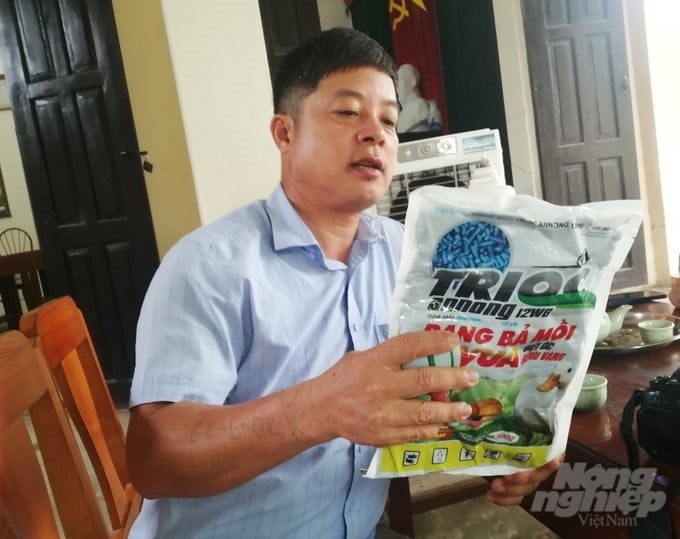May 16, 2025 | 10:06 GMT +7
May 16, 2025 | 10:06 GMT +7
Hotline: 0913.378.918
May 16, 2025 | 10:06 GMT +7
Hotline: 0913.378.918
Van Tra Agricultural Cooperative (Yen Thang commune, Yen Mo district, Ninh Binh) has a total rice farming area of over 300 hectares. Previously, most cooperative members had the habits of sowing, producing based on human labor and experience, and abusing chemical pesticides and fertilizers over a long period of time, causing the soil to become increasingly hardened and lack nutrients, so productivity and output were not high.

According to Mr. Dinh Xuan Nam, Director of Van Tra Agricultural Cooperative (pictured), with organic rice farming, rice plants grow and develop well; the environment is improved; and farmers' health and income increase significantly. Photo: Trung Quan.
Faced with that reality, the Cooperative's board of directors boldly researched and guided households on rice production in an organic direction, applying synchronous mechanization to increase economic efficiency.
Mr. Dinh Xuan Nam, Director of Van Tra Agricultural Cooperative, said that the Cooperative currently has 41 hectares converted from conventional production to organic production (using new varieties and organic fertilizers) and applying synchronous mechanization. Of these, 5 hectares participate in the "footprint-free fields" model implemented by the Provincial Agricultural Extension Center and Dai Thanh Joint Stock Company.
According to Mr. Dinh Xuan Nam, organic rice farming techniques are not much different from the way people are applying. However, increasing the use of organic fertilizers, biological pesticides, and bait traps to prevent harmful organisms has helped improve the mineral content and beneficial microorganisms in the soil, so rice plants grow and develop healthily; rice leaves are thick, hard, and not dark green like those fertilized with inorganic fertilizers, thus limiting pests. The average productivity reached 53–54 quintals/ha in the 2023 crop and is estimated at 61–62 quintals/ha in the 2024 spring crop, 15–20% higher than conventional production.
Regarding economic efficiency (not including amounts supported under Resolution 32/2022/NQ-HDND of the Provincial People's Council stipulating policies to support agricultural and rural economic development in Ninh Binh province for the 2022–2025 period and the company participating in building a model to support seeds and spraying), when farming organically combined with applying synchronous mechanization, households have reduced a lot of labor and increased profits.

Representatives of Ninh Binh Agricultural Extension Center, Dai Thanh Joint Stock Company, and Van Tra Agricultural Cooperative evaluated the model of using new varieties and organic fertilizers, and applying synchronous mechanization in Yen Mo district. Photo: Trung Quan.
Specifically, the cost for 1 rod (360 m2) is about VND 900,000, or VND 100,000 higher than using all chemical input material. However, just calculating the average productivity of the organic rice production model at 1.7 quintals/rod, with the dry rice selling price of VND 13,000–14,000/kg, farmers earn a profit of about 50%. More importantly, people's health and "plants' health," as well as the environment, have been significantly improved. Families with limitations on agricultural labor can both cultivate and earn profit from rice and can also take advantage of outside work to increase their income.
Mr. Dinh Van Dac, in Van Du Thuong village (Yen Thang commune, Yen Mo district), planted 1.7 acres of organic rice. He said that chemical fertilizers and pesticides stimulate rice growth and eliminate weeds and pests very quickly. But because of that advantage, many households abuse them during the farming process, causing the soil to be increasingly hardened and depleted of nutrients and the water environment to be polluted.
When they witness with their own eyes and directly apply the organic farming method, households truly have a comparison to evaluate and realize that, in order to develop sustainably, it is definitely compulsory to shift towards safe production.
"The family's 7 acres of rice using tray seedling, machine transplanting, and organic farming give a yield that is not inferior to the inorganic areas but is much less strenuous. Weed management also becomes much more convenient. Previously, in sowing, spraying for the third time could not eliminate all grass. But now I only need to spray once to feel secure," Mr. Bac excitedly said.

According to Mr. Dinh Van Dac (Van Du Thuong village, Yen Thang commune, Yen Mo district), to develop rice production sustainably, it is definitely compulsory to shift towards safe production. Photo: Trung Quan.
The effectiveness of organic farming is visible to everyone, but the rate of adoption is still modest because agricultural workers are mainly middle-aged or older people. Income mainly depends on the fields, so they still maintain the mentality of "take work for profit." When calculating the details and realizing that the cost of organic production is higher, they will not boldly invest. If there is a solution to lower the cost and increase the effectiveness of organic input materials (fertilizers, pesticides, biological products, etc.), then the rate at which households convert will certainly increase.
According to the Ninh Binh Department of Agriculture and Rural Development, the whole province's total rice area is now about 71,000 hectares. Of which, the area of specialty and high-quality rice was expanded to more than 54,000 hectares, accounting for 77% of the total area. The area of high-quality rice that is produced according to the organic direction and the program of new varieties and new technical advances according to Resolution 32/2022/NQ-HDND of the Provincial People's Council continues to expand. As of now, the whole province has over 4,000 hectares of high-quality rice produced organically.
In addition, linkage combinations along the value chain (using organic fertilizers, applying the tray seedling method, and transplanting machines) have been formed. According to statistics, organically produced rice associated with the value chain has increased profits by 15–20% for participating parties (businesses, cooperatives, farmers, etc.).

To control the product quality in organic production, Van Tra Cooperative acts as a focal point to connect with reputable units providing organic fertilizers and biological products to farmers. Photo: Trung Quan.
Mr. Dinh Van Khiem, Deputy Director of the Ninh Binh Department of Agriculture and Rural Development, assessed that models of rice farming in an organic direction applying mechanization in the province are the driving force to encourage, lead, and train farmers to develop agriculture in a green and sustainable direction and, at the same time, concretize and lay an important foundation for localities to implement the Ministry's Project "Develop integrated plant health management (IPHM) until 2030," recently approved.
Currently, Ninh Binh aims to become the tourism center of the country. Therefore, developing the production of organic agricultural products becomes even more urgent, serving as an important fulcrum for tourism development, especially experiential and ecological tourism.
Besides, studies show that rice production has high emissions in the agricultural sector. The main reasons are that intensive farming is not sustainable; high use of chemical fertilizers and irrigation water; improper management of residues such as straw and rice husks; inefficient use of energy in agriculture, etc.
Therefore, developing rice production in an organic, safe, and economical direction will be an important foundation for the province's agricultural sector to develop emission-reducing rice production, contributing to the overall development of the country's agricultural sector and implementing the Vietnamese Government's commitments to the international community.
Translated by Thu Huyen

(VAN) Cold-barn systems efficiently manage environmental and temperature conditions, which aids in the prevention of respiratory diseases in pigs and protects them from the vectors that transmit African swine fevers.

(VAN) To tackle challenges, the project 'Addressing key technical bottlenecks in the grouper supply chain in Vietnam' has been underway since 2024.

(VAN) The project 'Disease-Resilient and Sustainable Cassava Production Systems in the Mekong Region', funded by the Australian Center for International Agricultural Research (ACIAR), is being implemented from 2024 to 2028.

(VAN) Data from 10,000 farming households will help professionalize production organization and support the implementation of the One Million Hectares Program for High-Quality, Low-Emission Rice Cultivation.

(VAN) FAO Director-General QU Dongyu marks International Day of Plant Health at NENA conference.

(VAN) Deputy Minister of Agriculture and Environment Hoang Trung affirmed that floriculture and ornamental plants are a growing industry that receives significant global attention.

(VAN) The three staple crops dominating modern diets – corn, rice and wheat – are familiar to Americans. However, fourth place is held by a dark horse: cassava.